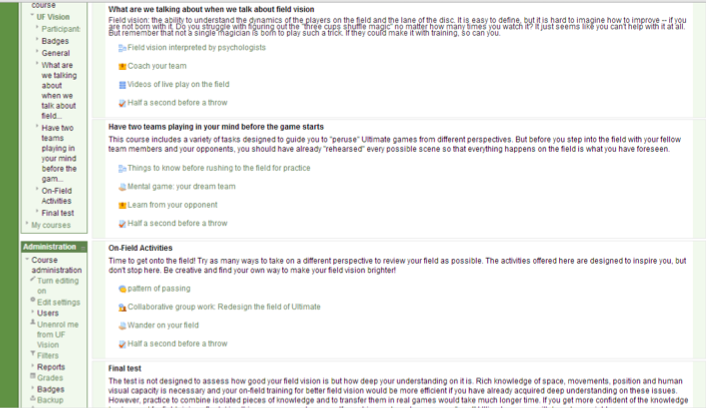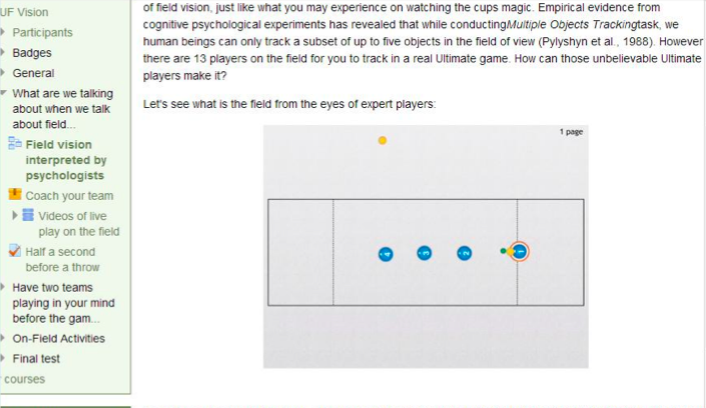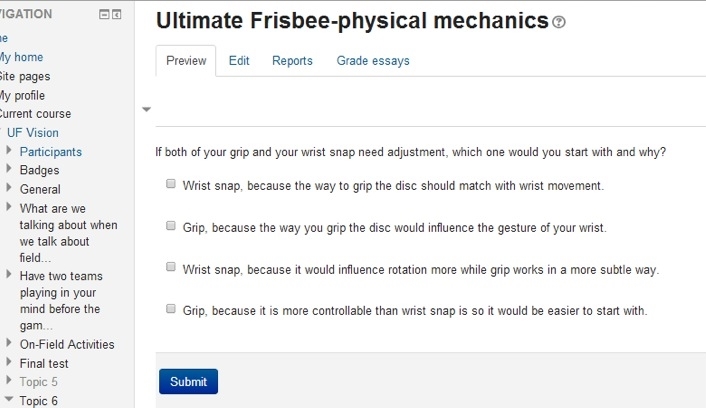I am a great fan of soccer - even though I do not take part in this sport myself, I enjoy thinking of it from the perspective of psychology. For deeper understanding of cognitive science behind sports, I worked for a semester with a classmate who had experience in playing and coaching Ultimate Frisbee. We collaborated to complete a Curriculum Design project, and such experience inspired me to explore further in Human Expertise and Cognitive Training in Sports.
Curriculum Design
Partner: David Hwang
Duration: Sep 2014 - Nov 2014
Research Methodology: Cognitive Task Analysis, Think Aloud, Cognitive Walkthrough, Experimental Design
College Ultimate Frisbee teams struggle in face of prioritizing learning goals with limited coaching resources and time. The vast majority of incoming players have never played the sport at a competitive level, and they are expected to learn many important variations on the forehand and backhand after initial two months. These players are encouraged to work on their individual throwing skills outside of practice to transfer to the situations presented at practice. Scaffolding towards self-taught throwing master is weak, and direct instruction is almost non-existent.
To solve this problem, my Partner David and I worked together to design a 7-week course for those who have just committed themselves to playing Ultimate for their university’s club team at a competitive level. Our course goal was to have our learners to be able to independently improve their throws (i.e., self teach) outside of team practice, achieving deep understanding of the schemas of Ultimate, the ability to flexibly utilize the skills in competitive games, and the dispositions of grit and growth mindset.
Cognitive walkthrough of one benchmark task: "watch a video of players doing throws, and rank them in terms of their skills"
As an Ultimate Frisbee player with 6 years' experience of competitive playing, David had access to leading ultimate coaches, captains and experienced practitioners as well as to beginning players. So we designed three benchmark tasks, and conducted empirical cognitive task analysis to see how Ultimate players would complete these tasks. Specifically, we focused on the competitive players - we made a cognitive model for the experienced players, and compared them with our target group (the beginners) to define the learning content.
Different types of Ultimate players. The experienced players and beginners are competitive players.
After interviewing both beginners and experienced players, we found that the underlying knowledge required to make a self-prove throw included two schemas: one for disc flight and another for the body mechanism to control the disc flight. According to the cognitive model of experienced players, dimensions of a throw trajectory included speed, height, angle and rotation. An expert player would mentally "design" an ideal disc flight on the four dimensions according to the situation on the field - distance between you and the defender, distance between you and your receiver, etc. To make such an ideal throw, they needed to retrieve the schema of the body mechanism - the combination of point of release, follow through, grip, elbow snap and wrist snap.
Cognitive model of experienced players
According to our interviews, beginners usually had one of the two schemas. Beginners had more experience in sports than novices. They decided to commit to Ultimate Frisbee either because they used to enjoy playing frisbee casually, or because they had experience in other sports and wanted to move on to this emerging sport. The former usually had better understanding of body mechanism, while the later had deeper understanding in trajectory.
Comparison between experts and beginners: examples of grip.
Hence, we defined the learning goal for learners as to internalize both "expert schemas" and know where and when to apply them: the course would focus on knowledge and skills of how to "design" a perfect trajectory based on situations on the field, and of how do "design" a body mechanism to make such a throw. In alignment with the learning goal, we designed instructions using pedagogic principles that promote far-transfer of knowledge. The course was 7 weeks long. Each week is devoted to a given topic. Within each week, there are three course modules to be completed: two “at-home” and one “on-the-field”. The on-the-field portion is to be completed between the two at-home portions so that learners could preview and review the key points before and after practicing on the field. David was in charge of the "on-the-field" and I focused on the "at-home" part.
Curriculum Outline
The "at-home" part was designed to be done individually in an online setting, so that the learners could have more time for self-explanation and retrospective. The online lessons also covered meta-cognitive skills of self-coaching, so that learners could go on to improve themselves even after the course ended. Alongside with the instruction part, I also designed a variety of assessments. The assessment were not only evaluative but also formative - the aim was to motivate the learners to reflect in deeper level and do more "mind practices" from different perspectives.



Human Expertise
I noticed that the experience of analyzing the cognitive processing behind sport practice ignited my passion in the cognitive science of human expertise. So I took the course of "Human Expertise" to further explore what expertise in soccer meant, what could make a soccer player a master, and how the acquisition of expertise might be accelerated cognitive training. In addition to the general expertise theories that we discussed in classroom, I also did some domain-specific literature review on soccer psychology. To interpret the features of expertise in the language of psychology helped me to analyze the feasibility of cognitive training for expertise in soccer. If you are interested in reviewing psychological research on soccer expertise, please click here to read the final paper I wrote for the course of "Human Expertise" for more details.
Elements of human expertise
Expertise in soccer: perceptual-cognitive advantages of elite soccer players
Cognitive Training Products
For the final paper of another course "Application of Cognitive Science", I further analyzed existing cognitive training products. It was interesting to see the similarity between the paradigms of sports training and those of psychological experiments. However, psychological methods outside the lab is not equal to successful application of cognitive science. Whether cognitive training is effective depends on how it contributes to the cognitive processing behind sports practice. If you are interested, the full paper is available here.
Existing sports cognitive training products have different focuses and paradigms.







